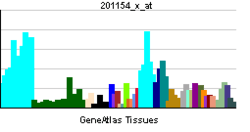60S ribosomal protein L4
| RPL4 | |||||||||||||||
|---|---|---|---|---|---|---|---|---|---|---|---|---|---|---|---|
| |||||||||||||||
| Identifiers | |||||||||||||||
| Aliases | RPL4, L4, Ribosomal protein L4 | ||||||||||||||
| External IDs | MGI: 1915141 HomoloGene: 748 GeneCards: RPL4 | ||||||||||||||
| RNA expression pattern | |||||||||||||||
  | |||||||||||||||
| More reference expression data | |||||||||||||||
| Orthologs | |||||||||||||||
| Species | Human | Mouse | |||||||||||||
| Entrez | |||||||||||||||
| Ensembl | |||||||||||||||
| UniProt | |||||||||||||||
| RefSeq (mRNA) | |||||||||||||||
| RefSeq (protein) | |||||||||||||||
| Location (UCSC) | Chr 15: 66.5 – 66.52 Mb | Chr 9: 64.17 – 64.18 Mb | |||||||||||||
| PubMed search | [1] | [2] | |||||||||||||
| Wikidata | |||||||||||||||
| View/Edit Human | View/Edit Mouse |
60S ribosomal protein L4 is a protein that in humans is encoded by the RPL4 gene.[3][4][5]
Ribosomes, the organelles that catalyze protein synthesis, consist of a small 40S subunit and a large 60S subunit. Together these subunits are composed of 4 RNA species and approximately 80 structurally distinct proteins. This gene encodes a ribosomal protein that is a component of the 60S subunit. The protein belongs to the L4E family of ribosomal proteins. It is located in the cytoplasm. As is typical for genes encoding ribosomal proteins, there are multiple processed pseudogenes of this gene dispersed through the genome.[5]
References
- ↑ "Human PubMed Reference:".
- ↑ "Mouse PubMed Reference:".
- ↑ Kenmochi N, Kawaguchi T, Rozen S, Davis E, Goodman N, Hudson TJ, Tanaka T, Page DC (Aug 1998). "A map of 75 human ribosomal protein genes". Genome Res. 8 (5): 509–23. doi:10.1101/gr.8.5.509. PMID 9582194.
- ↑ Bagni C, Mariottini P, Annesi F, Amaldi F (Feb 1994). "Human ribosomal protein L4: cloning and sequencing of the cDNA and primary structure of the protein". Biochim Biophys Acta. 1216 (3): 475–8. doi:10.1016/0167-4781(93)90017-8. PMID 8268230.
- 1 2 "Entrez Gene: RPL4 ribosomal protein L4".
Further reading
- Wool IG, Chan YL, Glück A (1996). "Structure and evolution of mammalian ribosomal proteins.". Biochem. Cell Biol. 73 (11-12): 933–47. doi:10.1139/o95-101. PMID 8722009.
- Chan YL, Olvera J, Wool IG (1995). "The primary structures of rat ribosomal proteins L4 and L41.". Biochem. Biophys. Res. Commun. 214 (3): 810–8. doi:10.1006/bbrc.1995.2359. PMID 7575549.
- Maruyama K, Sugano S (1994). "Oligo-capping: a simple method to replace the cap structure of eukaryotic mRNAs with oligoribonucleotides.". Gene. 138 (1-2): 171–4. doi:10.1016/0378-1119(94)90802-8. PMID 8125298.
- Suzuki Y, Yoshitomo-Nakagawa K, Maruyama K, et al. (1997). "Construction and characterization of a full length-enriched and a 5'-end-enriched cDNA library.". Gene. 200 (1-2): 149–56. doi:10.1016/S0378-1119(97)00411-3. PMID 9373149.
- Twiss JL, Smith DS, Chang B, Shooter EM (2000). "Translational control of ribosomal protein L4 mRNA is required for rapid neurite regeneration.". Neurobiol. Dis. 7 (4): 416–28. doi:10.1006/nbdi.2000.0293. PMID 10964612.
- Uechi T, Tanaka T, Kenmochi N (2001). "A complete map of the human ribosomal protein genes: assignment of 80 genes to the cytogenetic map and implications for human disorders.". Genomics. 72 (3): 223–30. doi:10.1006/geno.2000.6470. PMID 11401437.
- Andersen JS, Lyon CE, Fox AH, et al. (2002). "Directed proteomic analysis of the human nucleolus.". Curr. Biol. 12 (1): 1–11. doi:10.1016/S0960-9822(01)00650-9. PMID 11790298.
- Jäkel S, Mingot JM, Schwarzmaier P, et al. (2002). "Importins fulfil a dual function as nuclear import receptors and cytoplasmic chaperones for exposed basic domains.". EMBO J. 21 (3): 377–86. doi:10.1093/emboj/21.3.377. PMC 125346
 . PMID 11823430.
. PMID 11823430. - Yoshihama M, Uechi T, Asakawa S, et al. (2002). "The human ribosomal protein genes: sequencing and comparative analysis of 73 genes.". Genome Res. 12 (3): 379–90. doi:10.1101/gr.214202. PMC 155282
 . PMID 11875025.
. PMID 11875025. - Strausberg RL, Feingold EA, Grouse LH, et al. (2003). "Generation and initial analysis of more than 15,000 full-length human and mouse cDNA sequences.". Proc. Natl. Acad. Sci. U.S.A. 99 (26): 16899–903. doi:10.1073/pnas.242603899. PMC 139241
 . PMID 12477932.
. PMID 12477932. - Lehner B, Semple JI, Brown SE, et al. (2004). "Analysis of a high-throughput yeast two-hybrid system and its use to predict the function of intracellular proteins encoded within the human MHC class III region.". Genomics. 83 (1): 153–67. doi:10.1016/S0888-7543(03)00235-0. PMID 14667819.
- Bouwmeester T, Bauch A, Ruffner H, et al. (2004). "A physical and functional map of the human TNF-alpha/NF-kappa B signal transduction pathway.". Nat. Cell Biol. 6 (2): 97–105. doi:10.1038/ncb1086. PMID 14743216.
- Gerhard DS, Wagner L, Feingold EA, et al. (2004). "The status, quality, and expansion of the NIH full-length cDNA project: the Mammalian Gene Collection (MGC).". Genome Res. 14 (10B): 2121–7. doi:10.1101/gr.2596504. PMC 528928
 . PMID 15489334.
. PMID 15489334. - Andersen JS, Lam YW, Leung AK, et al. (2005). "Nucleolar proteome dynamics.". Nature. 433 (7021): 77–83. doi:10.1038/nature03207. PMID 15635413.
- Rual JF, Venkatesan K, Hao T, et al. (2005). "Towards a proteome-scale map of the human protein-protein interaction network.". Nature. 437 (7062): 1173–8. doi:10.1038/nature04209. PMID 16189514.
- Tu LC, Yan X, Hood L, Lin B (2007). "Proteomics analysis of the interactome of N-myc downstream regulated gene 1 and its interactions with the androgen response program in prostate cancer cells.". Mol. Cell Proteomics. 6 (4): 575–88. doi:10.1074/mcp.M600249-MCP200. PMID 17220478.
This article is issued from Wikipedia - version of the 9/19/2016. The text is available under the Creative Commons Attribution/Share Alike but additional terms may apply for the media files.